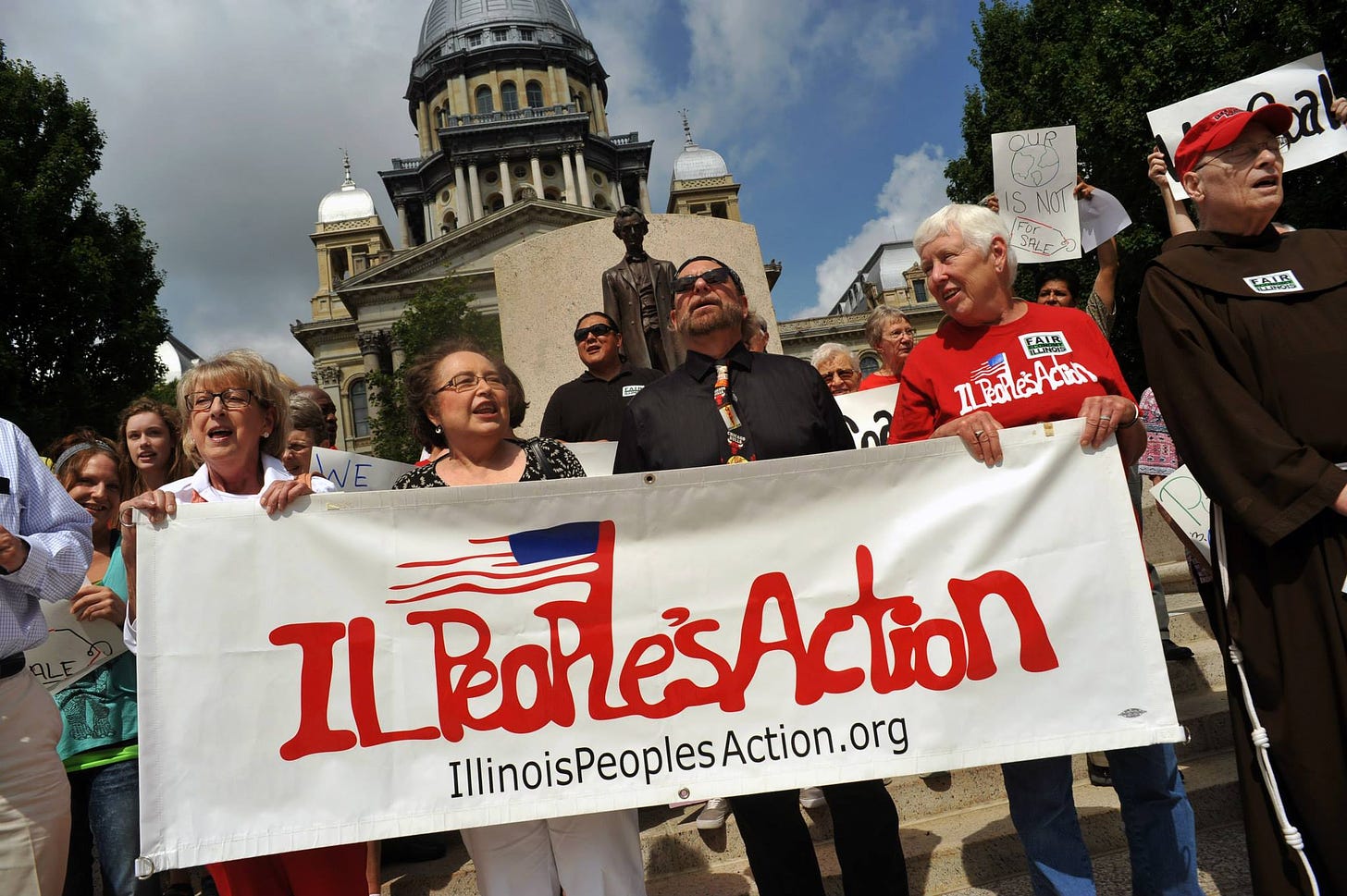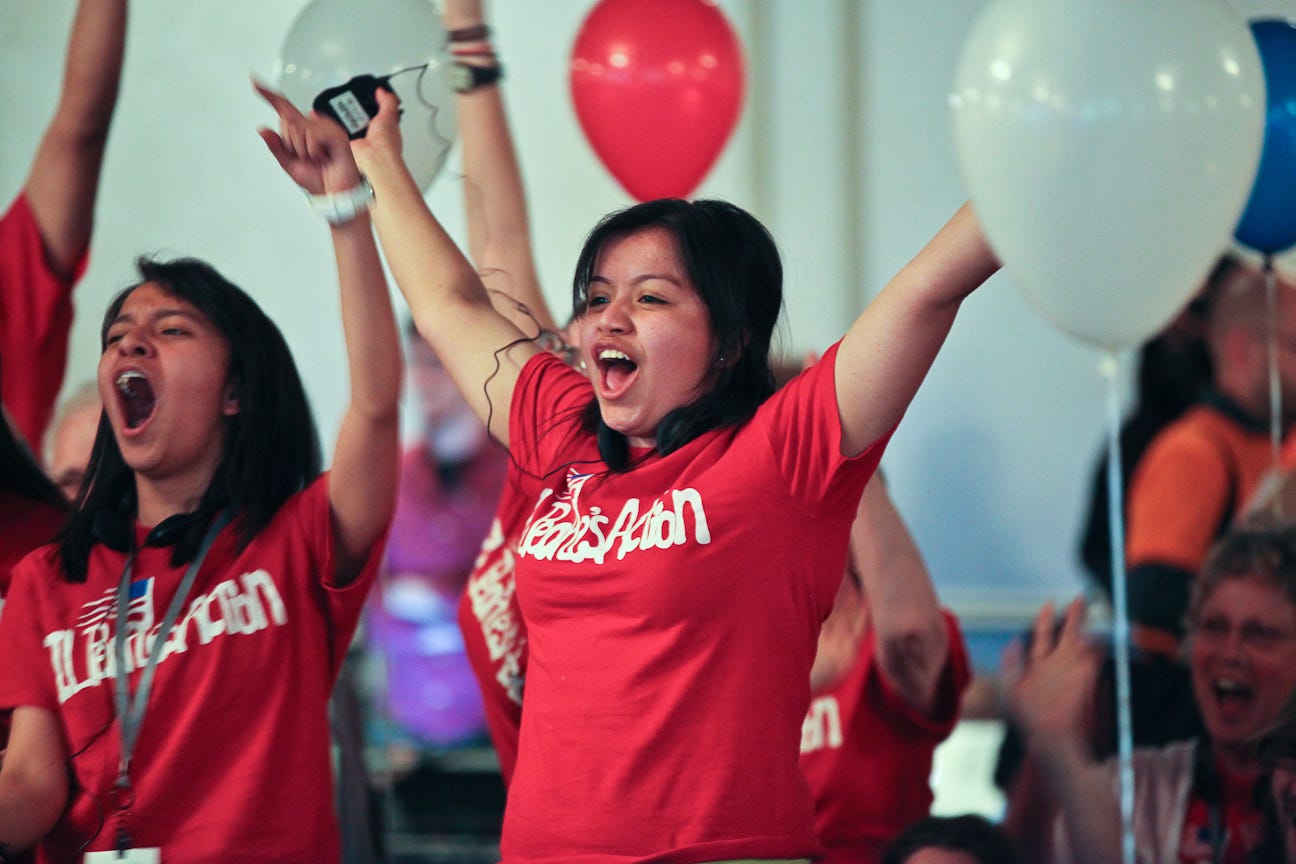Organizing as a Trade with Don Carlson
Like in every trade, a good education starts with the fundamentals.
We’re continuing our series of conversations with veteran organizers around the fundamentals. This time, I got to sit down with Don Carlson.
Carlson cut his organizing teeth 45 years ago in his home state of Iowa. In college, he volunteered at a tenants rights hotline and soon noticed that many of the complaint calls were coming from families living in one set of properties. As luck would have it, he got word that a group called Citizens for Community Improvement (CCI) would be holding a meeting between these families and the landlord. This piqued his interest. Then he was told by someone to “be careful” as CCI was a “radical” group. This only made him more interested in checking out the meeting.
He remembers it like it was yesterday. The church basement filled with mostly Black women with kids. The slumlord was up on the stage taking serious heat.
“I had never experienced something like that, where real people were directly confronting, with anger and emotion, demanding the lives their families deserved. I had no idea how the meeting happened but it was clear what was happening.”
From that moment on, he was hooked.
Since then, Carlson has taken on slumlords, bankers, payday lenders, and polluters.
Today, Don is Executive Director and founder of Illinois People’s Action—the largest multi-issue, regional community organization in downstate Illinois.
What organizing fundamentals do you think are most essential to teach right now?
Two stand out:
First, Organizing is More than Activism. I would not have thought this would be a primary concern except for the last 5-10 years. We always had “activism,” but with the advent of social media this has become a role in and of itself. I think this is self-evident, especially in the times of Covid with people thinking the number of “likes” somehow means something in organizing terms. It doesn’t.
If a fundamental of organizing is arguably sublimating your personal public role to empower others, this becomes a particular problem. In some important ways activism is perceived as “leadership” which then complicates matters even further if the primary role of the organizer is to develop leaders and build organizations.
The other would be the One-on-One. You can do one-on-ones well and still be a marginal organizer, but it is hard to be bad at one-on-ones and still be a good organizer. While we all have seen and used various lists of good questions and approaches it really boils down to “Are you actually talking with people intentionally?”
I organized for over a decade or more without ever using the phrase “one on one,” but it’s what two of the people who trained me - Paul Battle and Joe Fagan - made me do by going door-to-door or having conversations with people after various neighborhood or church meetings.
You’ve been at this a minute, did anything in the pamphlet stand out as different or fresh in how it was presented?
The fundamental of “You’re an organizer, not a facilitator.” I can see this in other organizers quickly, but it’s harder to see it in myself. This notion is probably the finest line that can be drawn in the relationship between an organizer and a leader or leaders. In my early times doing clergy one-on-ones I would be very reluctant to answer their question, “What are you really trying to do here?” while turning it back to them about what they wanted to do; still leaving them perplexed.
The right time of disclosure is an art. My very first one-on-one in Central Illinois in seeking to build a new organization I danced around this question for hours, until I finally answered it directly (i.e. to build an organization). Then the conversation took on a much more realistic path, rather than generalized, unspecific conversation. If done too quickly, the conversation becomes “selling organizing,” which can be done but sometimes isn’t long lasting. At some point you need to show your cards.
What do you all do at Illinois People’s Action to teach and practice good organizing?
I think of organizing as a tradecraft; not much different than other trades like theater directors, teachers or politicians. New organizers obviously bring to the job their own life experiences and their personalities, including, hopefully, those things you can't coach like anger at injustice, liking people, being challenged and such. But everything else you can coach, and as an organizer those are the things that can be learned, just like leadership can be a learned activity.
At IPA we think of this new occupational path of being a community organizer as three interrelated learning buckets.
Learn about the basics
Practice with leaders who already have experience within the organization
Take their new, learned skills and practice out into the real world
Learning about the Basics: Every new staff at IPA goes through Leadership Training first. We tell them, "This is the training our leaders go through." We do the actual training and then break that down into "What will this mean for you as an organizer working within IPA with both existing and new leaders?"
We also recommend reading about historic organizing struggles and paying attention to the role of community organizers, the people they worked with, and what happened. Obviously, most of these books are about noble, heroic figures who won in the end; the mission of authors is to sell books to the public and not organizing instruction manuals! But the point is people have organized in the past, and the best books can provide insight on their challenges and how they overcame them.
If a young organizer can read the real story of Rosa Parks—whose bus sit-in wasn't simply because she was tired, but a tactic; planned well-in-advance, working with organizer E.D. Nixon and the organization, after Parks had learned organizing at Highlander Institute—that history can turn-on a lightbulb!While there's a local park in my town dedicated to Rosa Parks (as well there should be), there's no park named for E.D. Nixon.
But no E.D. Nixon, no Rosa Parks.
Practicing with Leaders Who Already Have Experience within the Organization: Organizers need to talk to people. We start with people within our own organization. We prepare leaders to expect calls from new staff asking to meet with them and then we give new staff a list of leaders available for one-to-ones. This usually starts about week three for a new organizer. While doing “practice” one-to-ones, with a list of potential questions they may want to ask during an intentional conversation, the real point is to get them talking to people.
In the beginning, we debrief every one-to-one with them: What did they learn about the leader? What is that leader's sacred story? What keeps that leader engaged in the organizing work of IPA? Did the new organizer ask the leader for others to talk with? Did the leader give them referrals?And then that leads to week 4 when they begin to schedule one-to-ones with the referrals. We don't rush this BUT organizers need to know the secret to their work and success is talking to people; that is the core part of their work. Organizers can spend too much time talking with other organizers, or contemplating the work. So we provide them with a breakdown of how they should be structuring their time leading up to their 6 month review (at which time the goal is for them to feel comfortable in their job and to be fully engaged in it.) We have a LOT of supervision early on.
Taking their learned skills and practice out into the real world: Even as new organizers are learning their craft, meeting existing leaders and practicing 1-1s, they are having opportunities to see organizing in action. They first observe and then are engaged in developing agendas for meetings, participating in meetings, debriefing those meetings.
Every existing organizer has an obligation to share what they know with a new organizer. My plumber brought an apprentice with him. Doctors bring residents into the operating room. Seasoned organizers need to mentor new organizers. I was lucky enough to have Father Joe Fagan, Paul Battle and Loma Thomas mentor me during my early years. I don't recall a single time being told what to do, but countless questions surrounding, "Have you thought about this?"
Starting my organizing back in Waterloo, Iowa we were organizing rent strikes because of substandard housing and lack of any meaningful code enforcement. We discovered the state housing code hadn't been updated since 1919 and had a meeting with the state public health administrator at the capitol on the issue. The meeting was a disaster and I left completely lost on what to do next. The two-hour car drive back home with Loma was my in vivo education on power and political decision-making within the context of our tenant organizing. Eventually we ended up winning the uniform landlord and tenant act as law. But without that car conversation, and Loma helping me think through those dynamics that are now second nature to me, I probably wouldn't be an organizer today.Mentors have an obligation to help our new organizers understand what is false, what is true, and what's important. Reading Rules for Radicals is good, but it won't answer those questions in a room of tenant families renting from slum landlords.
Was there a book, article, or something else that was especially helpful to you when you were first learning to do the thing?
I don't remember where or who I got it from, but probably around 1980 someone at Des Moines CCI gave me a mimeograph copy of "Finding and Making Leaders" by Nicholas von Hoffman. Von Hoffman wrote this in 1963 and it's a gem. Decades later I spent time with Bill Greider—a Washington Post colleague and friend of von Hoffman—after he left organizing with Saul Alinsky and worked for the Post. Evidently von Hoffman was the real deal. The mimeograph demonstrates experience which, while dated in sections, reads like it could have been written yesterday. I've just re-read the paper after 40 years, and I've internalized so much of it I thought I had thought of these things myself, which simply proves the point there's nothing new under the sun.
You can learn more about Don and Illinois People’s Action here.





